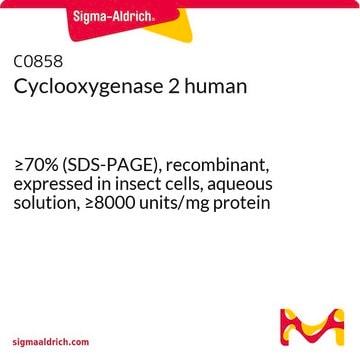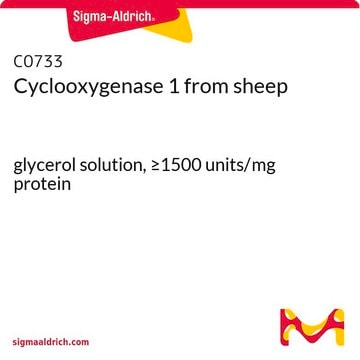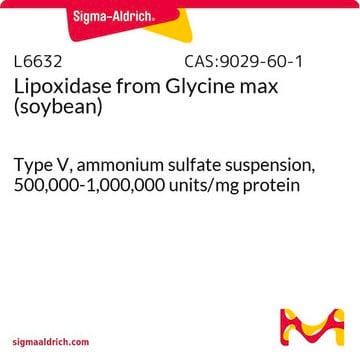437996
5-Lipoxygenase, Human, Recombinant, S. fruigiperda
5-Lipoxygenase, Human, Recombinant, S. frugiperda E.C 1.13.11.34, catalyzes the formation of 5(S)-HpETE from arachidonic acid and its subsequent conversion to leukotriene A4.
Synonyme(s) :
5-LO
Se connecterpour consulter vos tarifs contractuels et ceux de votre entreprise/organisme
About This Item
Numéro de classification (Commission des enzymes):
Code UNSPSC :
12352202
Nomenclature NACRES :
NA.77
Produits recommandés
Niveau de qualité
Forme
liquid
Activité spécifique
~20 U/mg
Fabricant/nom de marque
Calbiochem®
Conditions de stockage
OK to freeze
avoid repeated freeze/thaw cycles
Conditions d'expédition
wet ice
Température de stockage
−70°C
Description générale
Recombinant, human 5-Lipoxygenase expressed in S. fruigiperda insect cells using a baculovirus overexpression system. 5-LO catalyzes the formation of 5(S)-HpETE from arachidonic acid and its subsequent conversion to leukotriene A4. It is localized in the cytosol of resting human and rat peripheral blood neutrophils, whereas it is found in the nucleus in rat basophilic leukemia cells and human alveolar macrophages. Upon stimulation of the cell, 5-LO translocates to the nuclear membrane where it is found in association with 5-LO activating protein (FLAP) and with the 85 kDa cPLA2.
Recombinant, human 5-Lipoxygenase expressed in S. fruigiperda insect cells using a baculovirus overexpression system. It is localized in the cytosol of resting neutrophils, and is found in the nucleus in rat basophilic leukemia cells and human alveolar macrophages. Upon stimulation of the cell, 5-LO translocates to the nuclear membrane where it is found in association with 5-LO activating protein (FLAP) and with the 85 kDa cPLA2.
Avertissement
Toxicity: Standard Handling (A)
Définition de l'unité
One unit is defined as the amount of enzyme that consumes 1.0 nmol of oxygen per min at 25°C in 50 mM Tris-HCl, 100 µM arachidonate, 2 mM CaCl₂, 1 mM ATP, 250 µM oxygen. Oxygen consumption can be measured using a oxygraph equipped with a Clark oxygen electrode.
Forme physique
In 100 mM Tris containing 5 mM EGTA, pH 8.0.
Reconstitution
Following initial thaw, aliquot and freeze (-70°C).
Autres remarques
Brock, T.G., et al. 1997. J. Biol. Chem.272, 8276.
Pouliot, M., et al. 1996. Eur. J. Biochem.238, 250.
Zhang, Y.Y., et al. 1993. J. Biol. Chem.268, 2535.
Shimizu, T., et al. 1984. Proc. Natl. Acad. Sci. USA81, 689.
Pouliot, M., et al. 1996. Eur. J. Biochem.238, 250.
Zhang, Y.Y., et al. 1993. J. Biol. Chem.268, 2535.
Shimizu, T., et al. 1984. Proc. Natl. Acad. Sci. USA81, 689.
Informations légales
CALBIOCHEM is a registered trademark of Merck KGaA, Darmstadt, Germany
Code de la classe de stockage
10 - Combustible liquids
Classe de danger pour l'eau (WGK)
WGK 1
Point d'éclair (°F)
Not applicable
Point d'éclair (°C)
Not applicable
Certificats d'analyse (COA)
Recherchez un Certificats d'analyse (COA) en saisissant le numéro de lot du produit. Les numéros de lot figurent sur l'étiquette du produit après les mots "Lot" ou "Batch".
Déjà en possession de ce produit ?
Retrouvez la documentation relative aux produits que vous avez récemment achetés dans la Bibliothèque de documents.
Les clients ont également consulté
Ha Thi Nguyen et al.
Scientific reports, 10(1), 15965-15965 (2020-10-01)
Natural metabolites with their specific bioactivities are being considered as a potential source of materials for pharmacological studies. In this study, we successfully isolated and identified five known clerodane diterpenes, namely 16-oxo-cleroda-3,13(14)E-dien-15-oic acid (1), 16-hydroxy-cleroda-3,13-dien-15-oic acid (2), 16-hydroxy-cleroda-4(18),13-dien-16,15-olide (3), 3α,16α-dihydroxy-cleroda-4(18),13(14)Z-dien-15,16-olide
Mater H Mahnashi et al.
Evidence-based complementary and alternative medicine : eCAM, 2022, 7921408-7921408 (2022-04-12)
Background. The current study aims to give a scientific origin for employing Habenaria plantaginea Lindl. as a potential candidate against nociception, inflammation, and pyrexia. The pharmacological studies were performed on crude extract and subfractions. In the gas chromatography-mass spectroscopy analysis
Notre équipe de scientifiques dispose d'une expérience dans tous les secteurs de la recherche, notamment en sciences de la vie, science des matériaux, synthèse chimique, chromatographie, analyse et dans de nombreux autres domaines..
Contacter notre Service technique









